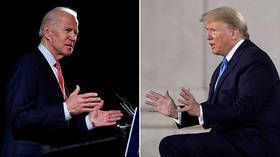Is the US abandoning its war on Iran to focus directly on the so-called China threat?

Saudi Arabia was made nervous by a recent US decision to remove some of its military hardware from the kingdom. Is the US punishing Riyadh for its disastrous oil price war, or has it given up on its bid to confront Iran?
After a decades-long, disturbingly cozy relationship, the Trump administration recently announced it will be removing its Patriot missile defence system and some fighter aircraft from the kingdom of Saudi Arabia. The Trump administration deployed the advanced missile defence system to the country following an attack on Saudi Arabia’s Aramco oil facilities, which was widely blamed on Tehran on strenuously compiled evidence.
Altogether, the US will pull two batteries which had been advanced to guard oil facilities along with about 300 personnel who were deployed to operate those batteries. A THAAD anti-ballistic missile defence system will remain, however. The move comes only a few months after the US began to increase its military presence in Saudi Arabia to send a very strong warning to its main adversary in the region, Iran.
Funnily enough, it was the US patriot missile defence system which failed to stop the drones and cruise missiles that famously attacked Saudi Arabia last year. According to think tank CSIS, Iran’s ballistic and cruise missile capabilities could overwhelm any Saudi missile defence system. Billions of dollars’ worth of equipment well spent, if you ask me.
When queried about the recent decision, the US president said, “We’re doing a lot of things all over the world militarily. We’ve been taken advantage of all over the world. Our military, and in the sense that we’re – and this has nothing to do with Saudi Arabia, this has to do with other countries frankly, much more. We have the most powerful military in the world.”
Also on rt.com ‘That’s not how friends treat friends’: US senators accuse Saudi Arabia of waging war on US oilWhile Trump has stated this has nothing to do with Saudi Arabia, and while we can continue to speculate the countless reasons why he would take such a symbolic measure, there are a few things we can piece together from the available evidence.
According to a Reuters report, Trump threatened Saudi Arabia’s Crown Prince Mohammed bin Salman (MBS) in an April phone call that he would pull troops out of the kingdom if the country did not comply with Washington’s demands to cut oil production. Apparently, Trump was so forthcoming – for lack of a better word – that MBS ordered his aides to leave the room out of what can only be described as sheer embarrassment.
The trouble began when Russia rejected an ultimatum from Saudi Arabia to cut oil production in light of falling prices back in March. Saudi Arabia responded by flooding the oil market with an additional 2.6 million barrels a day at a hugely discounted price, a move so reckless that it has damaged its standing with the US by hitting American shale producers and adversely affecting Republican-run states. You might say, in its bid to launch an oil price war with Russia and the rest of the world, the Saudi Kingdom has in effect cut off its nose to spite its own face.
That being said, the damage done to the global oil industry may only tell one part of the story. If we consider that the Patriot defence systems previously in place in Saudi Arabia were unable to stop a heavy attack (which was potentially launched by a ragtag group of rebels in Yemen), the removal of those additional assets may not be the huge blow to Saudi Arabia that experts appear to be predicting. As it transpires, Saudi Arabia will deploy its own advanced missile-defence systems to protect its oil assets.
Alternatively, there could be more to this story than meets the eye. Perhaps the world is waking up to the reality that Iran isn’t really worth the commotion and attention it has been receiving from the US military establishment. According to the New York Times, Israel’s intelligence apparatus believes Iran is no longer an imminent security threat to Israel (though I’m doubtful it ever was). This sentiment was echoed in a recent Wall Street Journal report which said that “officials” felt Iran “no longer poses an immediate threat to American strategic interests.”
Also on rt.com Yemen's health system has been wrecked by war, but Britain is still helping the Saudis bomb it – even during the Covid-19 pandemicIn the grand scheme of things, countering Iran is child’s play. In reality, the US is making some significant moves in the background which see it countering a larger and more threatening nuclear-capable power. According to the White House budget requests for 2021 and recent congressional testimony of senior US military commanders, the Pentagon intends to arm its marines with versions of the Tomahawk cruise missile carried on US warships. These developments are aimed at countering China in the western Pacific, where it appears to hold the upper hand with its land-based cruise and ballistic missile capabilities.
Concerned by these advancements, China has responded by telling Reuters that Washington should “stop moving chess pieces around” and “flexing its military muscles around China.” At the end of the day, it’s all about China. Any threat that Iran poses to the US or its allies can always be directly linked back to the overall threat that China poses to US economic interests anyway.
The coronavirus pandemic has given the Trump administration the perfect excuse to go after China with its muscles flexed and its accusations rampant. There has to be a reason why even US Secretary of State Mike Pompeo was prepared to dabble in what was largely considered to be a conspiracy theory (until further notice, of course).
If Trump is ramping up the pressure on China, then Pompeo’s on board, irrespective of what the facts are. This should tell you all you need to know about the trajectory we’re on and what we should expect in due course.
Think your friends would be interested? Share this story!
The statements, views and opinions expressed in this column are solely those of the author and do not necessarily represent those of RT.














